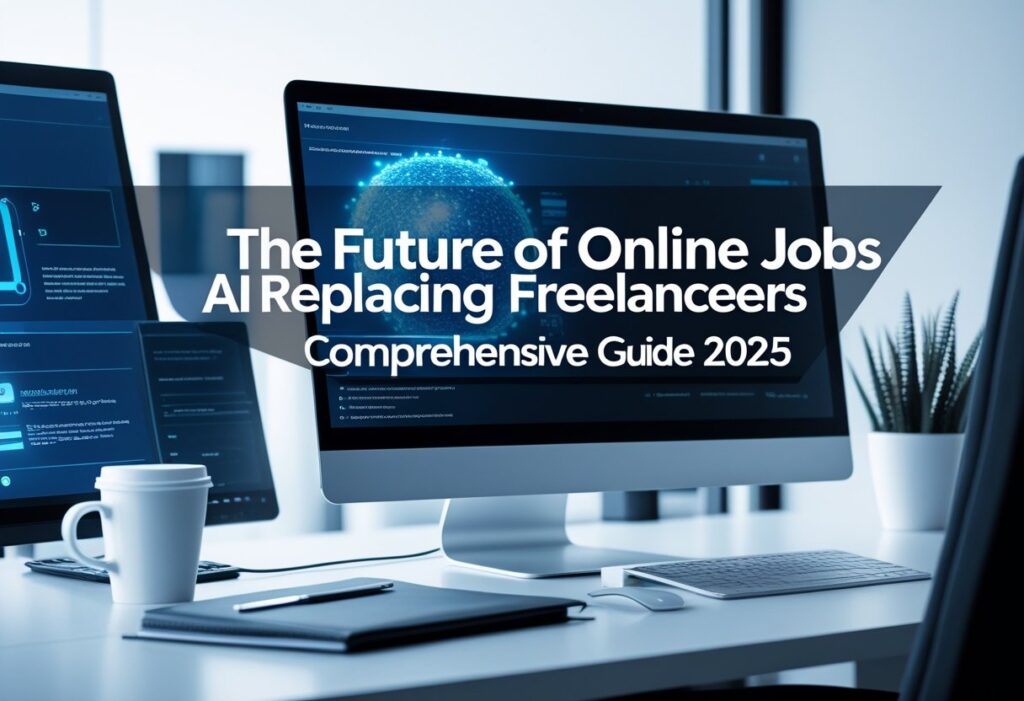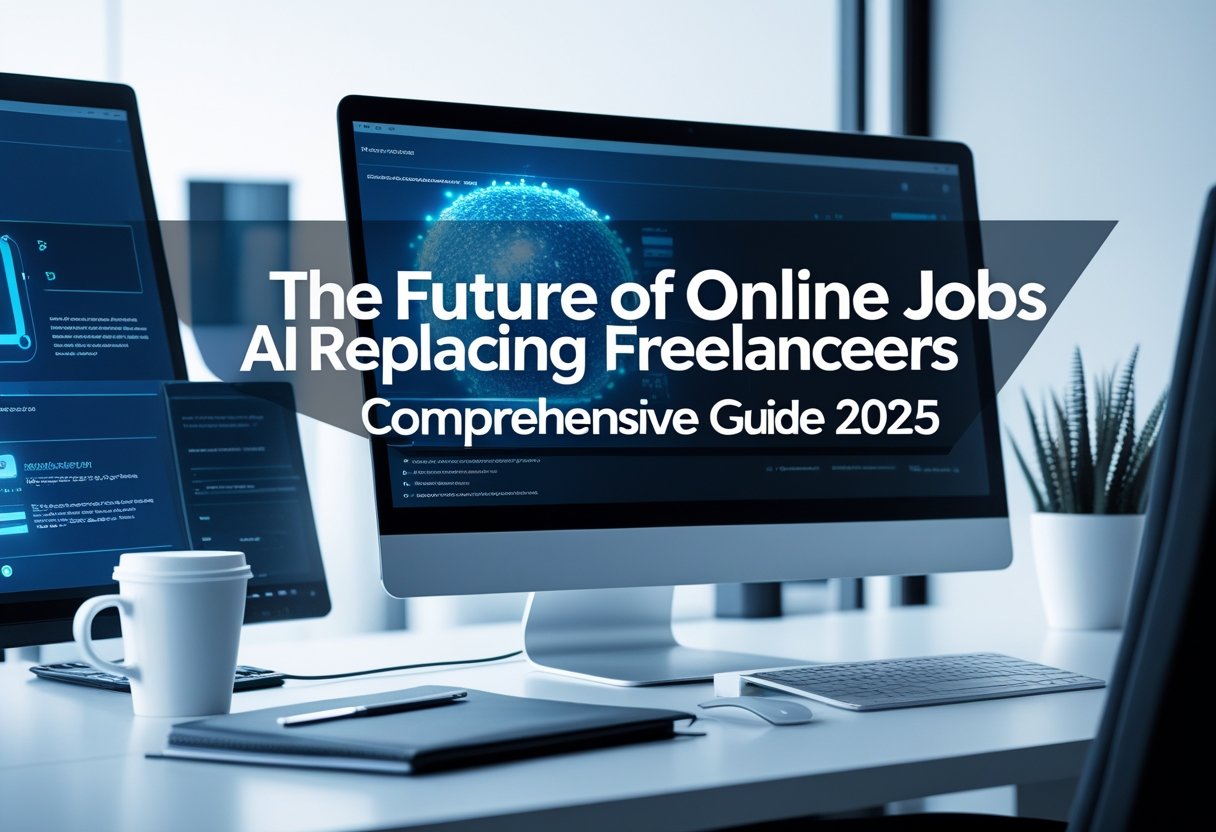Is AI replacing freelancers? Explore the real future of online jobs, where human creativity and strategy merge with AI tools. Learn how to adapt, the skills that remain essential, and how to future-proof your freelance career.

The Future of Online Jobs: AI Replacing Freelancers?
It’s hard to ignore the headlines. Another AI tool drops, promising to write, design, and code faster than any human. In freelance circles, from writer forums to developer chats, a low-grade hum of anxiety has become a constant background noise. Is this the beginning of the end for the independent professional, or just the start of a new, more complex chapter? The future of online jobs is being rewritten right now, and the narrative is more nuanced than you might think AI Replacing Freelancers.
The real story isn’t about a simple takeover. It’s about a fundamental shift. The freelancers who see AI as a collaborator, a junior assistant that never sleeps, are already pulling ahead. Those who dismiss it as a fad or fear it as a replacement are finding the ground getting softer beneath their feet. The future of online work isn’t about humans versus machines. It’s about humans with machines versus those without AI Replacing Freelancers.
The AI Invasion: What’s Actually Happening in the Gig Economy?

Let’s be brutally honest. AI isn’t coming for all freelance jobs. It’s coming for the tasks that are repetitive, predictable, and based on recognizable patterns. Think of it not as a tidal wave, but as a high tide that’s rising around certain islands of work. This reshaping will define the future of online jobs for years to come AI Replacing Freelancers.
For a content writer, AI can now produce a decent first draft on a straightforward topic. For a graphic designer, it can generate a hundred logo concepts in minutes. For a programmer, it can debug code or write standard functions. This is the work that often pays the bills, the bread-and-butter projects that fill the gaps between more exciting, high-value work. The very nature of these tasks is what makes the future of online jobs so uncertain for some AI Replacing Freelancers.
I know a freelance copywriter, Sarah, who used to spend half her day drafting 500-word product descriptions for e-commerce clients. It was reliable work, but mind-numbing. Last year, her biggest client started using an AI tool to generate those descriptions in-house. She lost that income stream overnight. Panic set in. But then, she pivoted. She approached the same client and offered a new service: “AI Content Refinement and Brand Alignment.” She now uses the AI to generate the first draft, then spends her time injecting brand voice, crafting compelling hooks, and ensuring the copy actually persuades a human to buy. She does in one hour what used to take three, and the client is happier because the final product is better. Her story is a microcosm of the adaptive future of online jobs.
This is the pattern. AI is automating the labor, not the insight.
Your New (Artificial) Junior Partner: How to Work With AI

Treating AI as a competitor is a losing battle. It’s faster, cheaper, and constantly improving. Treating it as a tool, however, is a game-changer for anyone considering the future of online jobs. Here’s a step-by-step way to think about integrating it into your workflow AI Replacing Freelancers.
Step 1: Identify Your Repetitive Tasks
Take a hard look at your workday. Where are you spending time on thinking that feels mechanical?
- Is it researching the basics of a new topic?
- Is it creating social media post variations?
- Is it transcribing interview audio?
- Is it writing basic HTML/CSS?
These are your prime candidates for AI assistance. Pinpointing them is the first step to securing your place in the future of online work.
Step 2: Prompt Crafting is the New Skill
You don’t just “ask” AI to do things. You brief it, like you would a junior employee. A bad prompt gets a generic, often useless, result. A great prompt gets you 80% of the way to a finished product. Mastering this is non-negotiable for the future of online jobs.
- Bad Prompt: “Write a blog post about SEO.”
- Good Prompt: “Write a 300-word introductory section for a blog post titled ‘Local SEO for Brick-and-Mortar Stores.’ The target audience is small business owners over 50 who are new to digital marketing. Use a helpful, reassuring tone and avoid technical jargon. Include a metaphor comparing local SEO to a town’s old-fashioned street directory.”
The good prompt provides context, audience, tone, and a creative direction. This is a human skill that AI can’t replicate and is critical for the future of online work.
Step 3: Edit, Don’t Just Accept
The output from an AI is a starting point, not a final draft. It’s your job to infuse it with humanity, nuance, and strategic thinking. Check for factual accuracy (AI is famously prone to “hallucinations”), add personal anecdotes, sharpen the argument, and ensure it aligns with the client’s unique brand voice. This editorial layer is where your real value lies in the new future of online jobs.
The Human Edge: Skills AI Can’t Replicate (Yet)
While AI masters pattern recognition, certain human capabilities remain firmly out of its reach. These are the skills you must now double down on to thrive in the future of online jobs.
- Strategic Insight: An AI can analyze data, but it can’t understand your client’s unspoken business fears or their five-year vision. It can’t connect a marketing campaign to a shift in company culture. That requires strategic, big-picture thinking that will be paramount in the future of online work.
- Authentic Creativity and Storytelling: AI can remix existing ideas, but it struggles with true originality and narrative. The ability to tell a compelling story that forges an emotional connection with an audience is profoundly human and will remain a cornerstone of the future of online jobs.
- Emotional Intelligence (EQ): Navigating client relationships, sensing frustration in an email, managing expectations, and building trust—these are the bedrocks of a successful freelance career. AI has zero EQ, ensuring a human role in the future of online work.
- Ethical Judgment and Nuance: Should we use this persuasive copy that borders on manipulative? Is this data visualization misleading? Making calls that involve ethics, morality, and subtle nuance requires a human conscience, a irreplaceable component of the future of online jobs.
Common Mistakes Freelancers Make When Facing AI
- Ignoring It Completely: Burying your head in the sand is a strategy for obsolescence in the future of online jobs. You don’t have to become an AI expert, but you need to understand its capabilities in your field AI Replacing Freelancers.
- Becoming Over-Dependent: Using AI to do all the thinking is a mistake. Your unique perspective atrophies. The goal is augmentation, not replacement of your own cognitive process, a key distinction for the future of online work.
- Selling AI Output as Their Own: This is a short-term, high-risk game. Clients will eventually notice the generic tone. Your reputation is built on your unique output, not your ability to operate a tool, and that reputation is your currency in the future of online jobs.
- Not Upskilling: If your entire skillset is based on tasks AI is good at, you’re in a vulnerable position. The time you save with AI should be reinvested in learning higher-level skills like strategy, consulting, or public speaking to prepare for the evolved future of online work.
The Road Ahead: A Transformed Landscape

The freelance marketplace of the future will likely be split into two tiers, defining the future of online jobs for a generation.
The first tier will be a commoditized, price-driven space where clients use AI for first drafts and hire freelancers cheaply and quickly for minor edits and assembly-line work. This will be a tough, low-margin environment AI Replacing Freelancers.
The second, more lucrative tier, will be the “AI-Augmented Expert.” These are freelancers who leverage AI to operate with incredible efficiency, allowing them to focus on high-level strategy, creative direction, and complex problem-solving. They won’t just be writers or designers; they’ll be content strategists, brand narrators, and growth consultants. They’ll charge a premium not for the hours they put in, but for the intellectual firepower and leadership they provide. This is the promising path in the future of online work.
The question isn’t whether AI will replace you. It’s whether you will be the freelancer who uses AI to replace the parts of your job you never liked, freeing you up to do the brilliant, human work that only you can do. Your actions today are crafting your own future of online jobs.
Frequently Asked Questions
1. I’m a freelance writer. Should I start putting “AI-Assisted” on my website?
Transparency is generally the best policy. Rather than a label that might be misinterpreted, frame it as a value proposition. Say you “leverage cutting-edge tools to enhance efficiency and research depth, allowing you to focus on crafting compelling narratives and strategic messaging.” This positions you as a forward-thinking professional, not just a tool user, which is a smarter approach for the future of online jobs.
2. My client is now using AI for the first drafts. How can I renegotiate my rate?
Don’t frame it as a demand. Schedule a conversation focused on value. Explain that with AI handling the initial drafting, you can now provide more value in other areas: deeper strategic input, more rounds of creative revision, A/B testing of copy, or performance analytics. You’re not just editing; you’re elevating the final product’s impact, which justifies your rate or even an increase. This is how you demonstrate your evolving role in the future of online work.
3. What’s the one AI tool that is a must-have for most freelancers?
There isn’t a single one-size-fits-all tool, but a subscription to a top-tier Large Language Model (LLM) like ChatGPT Plus or Claude is becoming as essential as a Microsoft Office license was a decade ago. It’s the Swiss Army knife for brainstorming, drafting, administrative tasks, and coding assistance across countless professions, a fundamental tool for the future of online jobs.
4. How can I tell if a potential client is just looking for a cheap human to edit AI gibberish?
Read the job description carefully. Vague descriptions, an extremely low budget for the scope, and a focus on “churning out” high volumes of content are red flags. During the interview, ask strategic questions like, “What is the primary business goal for this content?” or “Who is your ideal customer persona?” Clients who can’t answer these are likely looking for a factory worker, not a partner, a dynamic that will become more common in the future of online work.
5. Is it ethical to use AI for client work if I don’t explicitly tell them?
This is a grey area, but the ethical path is clear. If you are substantially using AI to generate the core deliverable, you should inform the client. Many are fine with it, as long as the final quality is high and you maintain accountability. Hiding it breaches trust and could damage your reputation and relationship if discovered. Your honesty is part of your brand and your key to long-term success in the future of online jobs.
6. Will AI eventually get so good that it truly does make freelancers obsolete?
It’s possible for certain repetitive, formulaic tasks. But the nature of business is human. Clients hire freelancers not just for a product, but for trust, for a shared vision, for a partnership. The highest-value work will always involve understanding human emotion, culture, and unstated needs—realms where AI, for the foreseeable future, lacks the lived experience to truly compete. This human element is the ultimate safeguard for the future of online work.

